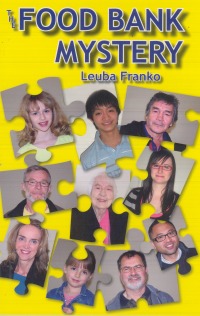| ________________
CM . . .
. Volume XVII Number 15. . . .December 10, 2010 
 |
The Food Bank Mystery.
Leuba Franko.
Winnipeg, MB: Leuba Franko, 2010.
116 pp., pbk., Order from Winnipeg Harvest, Communications Dept., 1085 Winnipeg Ave., Winnipeg, MB, R3E 0S2, $15.00 plus $2.50 shipping & handling.
ISBN 978-0-9865998-0-4.
Grades 5-9 / Ages 10-14.
Review by Mary Thomas.
*** /4
|
| |
|

excerpt:
"I know what bankrupt and economy mean," said Nathalie. "Jack told me. He learned it in university."
"Mr. Sutherland has been given the pink slip," said Stefan to his brother. "Another casualty in the meat-packing plant."
"It's a secret, but I know they have to get food at the food bank every two weeks," Nathalie added quietly.
"Too bad they don't live on a farm," said Uncle Daniel. "Then they could be independent like me. As long as I have chickens, eggs, onions, beets, carrots, and, and let's see...potatoes, I can get through a winter. Not like this city living where everyone's dependent on someone else. I'll never fire myself from the land."
"Though you may go bankrupt," Stefan smiled, as he clasped his hands behind his head.
Uncle Daniel patted his stomach. "Anyway, some of those people at the food bank are just plain lazy. They're used to food coming in packages and money coming from welfare cheques. I don't understand why they can't just get out there and do some kind of work."
The Food Bank Mystery is not a mystery of the usual whodunit variety. Instead, it is an attempt to answer the puzzling - and vexing - question of why, in a country basically as wealthy as Canada, there is a need for food banks and other supports for those with too little money to survive without them.
Through the eyes of Nathalie and her best friend, Jason, readers see the economic realities of life "two paycheques away from the food bank," life where, in order to live where one's children will not be surrounded by druggies and prostitutes, one must spend more than half of a reasonably good job's take-home pay on accommodation. Readers experience the delight of the peanut-butter-and-banana-toothpaste sandwich: a small amount of p.b. spread on a split loaf of stale French bread and topped with a squeeze of over-ripe banana straight from the peel. We sympathize with Jason's attempt to help out by not eating breakfast after his father is laid off from his job in a meat-packing plant and Nathalie's trying to understand her family's financial situation now that her mother is no longer employed cooking in the hospital kitchens. In our capitalist economy, one cannot blame a company for consolidating its operations in order to keep food prices low or for using the health-care budget wisely by more economically bringing in patient meals frozen from an adjacent province. Jason's father and Nathalie's mother are apparently unavoidable collateral damage.
Again, unlike your typical mystery, the puzzle is not solved, merely made more understandable. The conclusion, not surprisingly since the whole book is set in the context of a school social-studies project, is that the government should do something -- jobs for everyone and enough for everyone. This conclusion does raise a question in Nathalie's mind: "How much is enough . . . enough for anybody?" That is indeed a poser. And a result of this utopia would be that people like the head of Winnipeg Harvest would become redundant. When Nathalie puts the question to David Northcott, the actual head of Harvest, in an interview and asks what he would say, he replies, "I would say, 'Thank you very much.'" Which just about says it all. There are some jobs that should not exist.
As an examination of the subject of food banks, their suppliers, their clients, and their volunteers, The Food Bank Mystery is a great success. It leaves the reader with strong feelings of indignation and shame. A first step to getting something done about a problem is to raise awareness of it as a problem. As an teen novel, it is a bit too earnest to be truly engaging. Nathalie and Jason work a lot harder at this project than one would expect from most young teens (though I do admit that personal involvement has a way of concentrating the mind). The grandmotherly neighbour Mrs.Gislason is always in the right place at the right time with the right suggestion as to what they should do next, whether it is to occupy an empty in-service day or further their project's research. Frequently it is both. On the other hand, some characters are very believable. Nathalie's father, for example, strikes exactly the right note as the head of a household whose pride would prefer that his wife go stir-crazy cleaning house and baking cookies rather than have her assert her independence by improving her English and her employability. All in all, The Food Bank Mystery is a very worthwhile book and one I shall certainly recommend as a classroom read-aloud and focus of discussion. As a added bonus, teacher resources are available on the Harvest website listed on the verso of the title page.
Recommended.
Mary Thomas works in the library at Meadows West School in Winnipeg, MB, where there is a food drive for Winnipeg Harvest on the first two days of every month.

To comment
on this title or this review, send mail to cm@umanitoba.ca.
Copyright © the Manitoba Library Association. Reproduction for personal
use is permitted only if this copyright notice is maintained. Any
other reproduction is prohibited without permission.
NEXT REVIEW |
TABLE OF CONTENTS FOR THIS ISSUE
- December 10, 2010.
AUTHORS |
TITLES |
MEDIA REVIEWS |
PROFILES |
BACK ISSUES |
SEARCH |
CMARCHIVE |
HOME |
